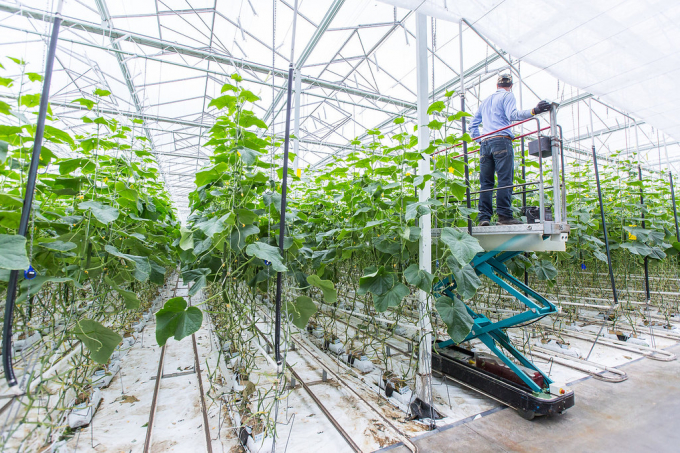June 14, 2025 | 20:05 GMT +7
June 14, 2025 | 20:05 GMT +7
Hotline: 0913.378.918
June 14, 2025 | 20:05 GMT +7
Hotline: 0913.378.918

Rows of herbs and lettuce growing in vertical farming machines at Cubic Farms' facility in Pitt Meadows, B.C. The province says it has updated the Agricultural Land Reserve (ALR) Use Regulation to allow for more intensive farming, known as vertical farming, where crops are grown in vertically stacked layers. Photo: Gian Paolo Mendoza/CBC
The B.C. government has announced changes to a land use regulation they say will create new opportunities for farmers to grow locally produced food.
In a press conference Saturday, the province said it had updated the Agricultural Land Reserve (ALR) Use Regulation to allow ALR land use for intensive crop production.
"There is a perception that growing systems such as vertical farms required approval of the ALC (Agricultural Land Commission). We will be updating the regulation to explicitly provide that crop production in a controlled environment structure is an allowable use on the ALR," the Ministry of Agriculture told CBC in an emailed statement.
According to the ministry, the changes will help increase local food supply through intensive farming or vertical farming, where crops are grown in vertically stacked layers to maximize space and reduce energy costs and greenhouse gas emissions.
Vertical farming could "make smaller pieces of land that are currently fallow more viable to grow on," the ministry said in a news release.
The ALR is a provincial zone that prioritizes agriculture as its main use. The regulation is designed to ensure food security, and protects approximately 4.7 million hectares of arable land in the province — presenting challenges for agritech farmers around accessing ALR lands.
"When the pandemic and recent climate change-related floods disrupted supply chains, British Columbians were reminded of the incredible bounty in our own backyard," Agriculture Minister Lana Popham said in a statement.
More than 150 agritech companies in B.C.

Opening opportunities for more vertical farms and innovative agritech practices in partnership with existing traditional farms helps solve our overall food security and food economy puzzle. Photo: Getty
Ravi Kahlon, minister of jobs, economic recovery and innovation, said by creating new opportunities for agritech companies to operate in B.C., the province is positioning itself to be a leader in finding innovative solutions to food security problems.
The province said agritech operations use technology and innovation, such as robotics for harvesting or controlled indoor growing systems, to produce more sustainable food, while using fewer resources.
B.C. has more than 150 agritech companies, including in areas of food processing, precision agriculture, bioproducts, food safety and traceability, and soil and crop technology.
"As the agriculture capital of B.C., we know in the City of Abbotsford just how important this industry and agritech is to our economy, community and food security in the province," said Abbotsford Mayor Henry Braun.
"Changes to the ALR regulation brings much-needed certainty and predictability for organizations to invest in and grow agritech in our community."
But Harold Steves, Richmond city councillor and co-founder of the ALR, is concerned by the changes, which he says could take arable land away from farmers who use more traditional agricultural methods.
"We're looking at losing land to agritech ... There's no question of that," he said.
Steves said the City of Richmond has been working to create more space on industrial lands by changing building requirements, specifically by permitting buildings in industrial zones to add another level to allow for space for agritech companies.
(CBC)

(VAN) Extensive licensing requirements raise concerns about intellectual property theft.

(VAN) As of Friday, a salmonella outbreak linked to a California egg producer had sickened at least 79 people. Of the infected people, 21 hospitalizations were reported, U.S. health officials said.

(VAN) With the war ongoing, many Ukrainian farmers and rural farming families face limited access to their land due to mines and lack the financial resources to purchase needed agricultural inputs.

(VAN) Vikas Rambal has quietly built a $5 billion business empire in manufacturing, property and solar, and catapulted onto the Rich List.

(VAN) Available cropland now at less than five percent, according to latest geospatial assessment from FAO and UNOSAT.

(VAN) Alt Carbon has raised $12 million in a seed round as it plans to scale its carbon dioxide removal work in the South Asian nation.

(VAN) Attempts to bring down the price of the Japanese staple have had little effect amid a cost-of-living crisis.